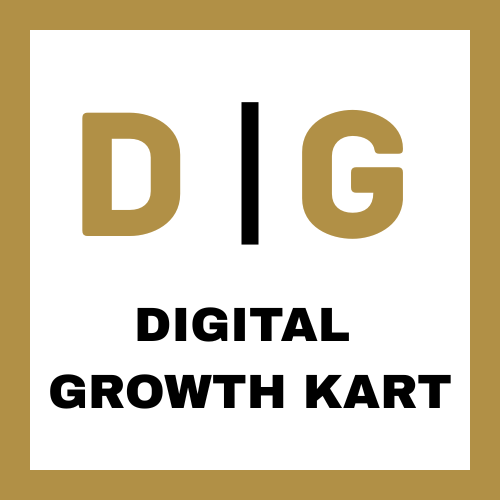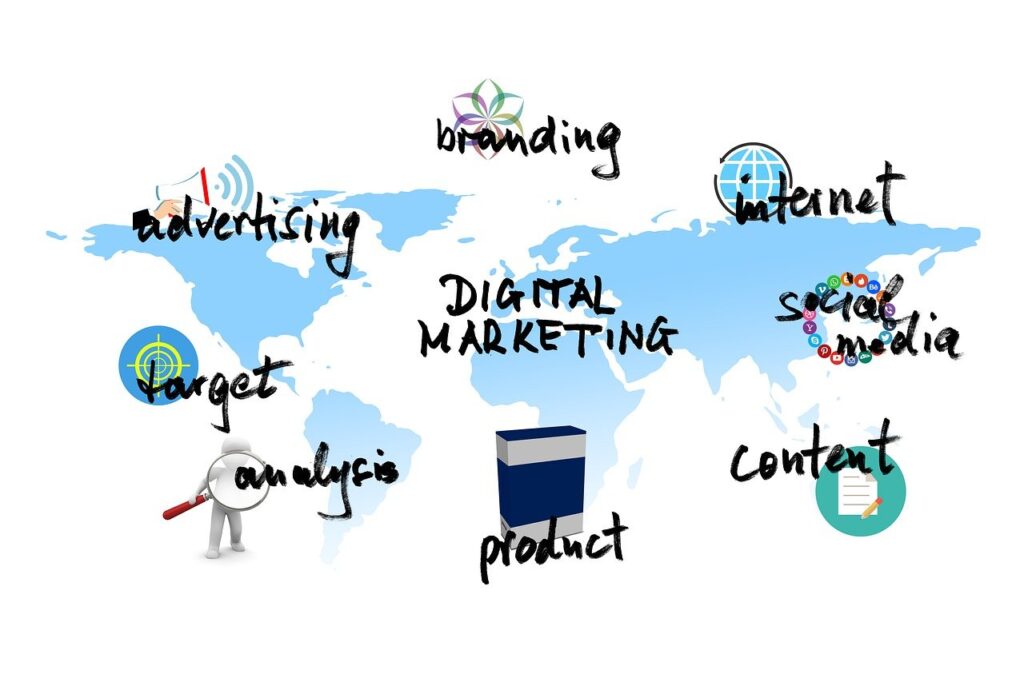
Introduction
In today’s interconnected world, simply having a great product or service isn’t enough. To truly thrive, businesses and individuals alike must master the art of reaching their audience where they spend most of their time: online. If the vast digital landscape feels like a daunting maze, you’re in the right place.
Welcome to the world of Digital Marketing! It’s more than just flashy ads; it’s a strategic approach to connecting with potential customers through various digital channels. From the moment you search for a product to the email reminding you about an abandoned cart, digital marketing is at play. It’s the engine that drives online visibility, engagement, and ultimately, growth.
In this comprehensive guide, we’ll demystify digital marketing, breaking down its core components and showing you why understanding it is crucial for unlocking online success in 2025 and beyond. Get ready to embark on your journey to making a real impact in the digital realm!
Main Sections
What Exactly is Digital Marketing?
Digital marketing, at its core, refers to any marketing efforts that use an electronic device or the internet. Businesses leverage digital channels such as search engines, social media, email, and other websites to connect with current and prospective customers. Think of it as marketing for the modern age, a strategic evolution from traditional methods like print ads, billboards, or radio commercials.
Unlike its traditional counterparts, digital marketing offers unparalleled precision, reach, and measurability. You can target specific demographics, track the exact return on your investment, and adapt your strategies in real-time based on data. This makes it an incredibly powerful and cost-effective way for businesses of all sizes to grow their brand, generate leads, and drive sales.
Your Essential Digital Marketing Arsenal: Key Channels Explored
To succeed online, you need to understand the various tools and channels at your disposal. Each plays a unique role in your overall strategy:
Search Engine Optimization (SEO)
Imagine someone looking for exactly what you offer. How do they find you? Most likely, they type it into a search engine like Google. SEO is the art and science of improving your website’s visibility when people search for products or services related to your business. The goal is to rank higher in organic (non-paid) search results.

Why it matters: Higher rankings mean more organic traffic, which translates to more potential customers, increased brand credibility, and ultimately, more conversions.
Key elements:
- Keyword Research: Understanding what words and phrases your audience uses.
- On-Page SEO: Optimizing your website content, titles, and structure for search engines.
- Off-Page SEO: Building credibility through backlinks from other reputable websites.
- Technical SEO: Ensuring your site is fast, mobile-friendly, and easily crawlable by search engines.
In 2025, SEO increasingly focuses on user intent, providing comprehensive answers, and demonstrating E-E-A-T (Experience, Expertise, Authoritativeness, Trustworthiness) to search engines.
Content Marketing
Content marketing isn’t just about writing blog posts; it’s about creating and distributing valuable, relevant, and consistent content to attract and retain a clearly defined audience — and, ultimately, to drive profitable customer action. This can take many forms:
Why it matters: Builds trust and authority, nurtures leads, supports SEO efforts, and keeps your audience engaged.
Examples:
- Blog Posts & Articles: In-depth guides, how-tos, industry news, thought leadership.
- Videos: Tutorials, vlogs, product demonstrations, interviews.
- Infographics: Visual representations of data and information.
- E-books & Whitepapers: Longer-form, educational content.
- Podcasts: Audio content for on-the-go consumption.
In 2025, personalized content experiences and short-form video content (like YouTube Shorts or Instagram Reels) are dominating the content landscape.
Social Media Marketing (SMM)
Social media marketing involves using social media platforms (like Facebook, Instagram, LinkedIn, TikTok, X/Twitter, etc.) to connect with your audience, build brand awareness, drive website traffic, and generate sales.
Why it matters: Directly engages with your audience, fosters community, allows for powerful audience targeting for ads, and provides a platform for customer service.
Key activities:
- Posting Regular Content: Sharing engaging text, images, and videos.
- Audience Interaction: Responding to comments, messages, and mentions.
- Running Paid Social Media Ads: Highly targeted campaigns to reach specific demographics.
- Influencer Marketing: Collaborating with individuals who have a strong social media following.
In 2025, social commerce (shopping directly on social platforms), live streaming, and authentic, user-generated content are becoming increasingly important.
Pay-Per-Click (PPC) Advertising
PPC is a model of internet advertising in which advertisers pay a fee each time one of their ads is clicked. Essentially, you’re buying visits to your site rather than attempting to “earn” those visits organically. The most common form of PPC is search engine advertising (e.g., Google Ads), where you pay for your ad to appear at the top of search results.
Why it matters: Provides instant visibility, offers precise targeting options, and delivers highly measurable results, allowing for quick optimization of campaigns.
Examples:
- Search Ads: Text-based ads appearing on search engine results pages.
- Display Ads: Visual ads (banners) on websites and apps.
- Video Ads: Ads played on platforms like YouTube.
- Shopping Ads: Product listings with images and prices.
With advances in AI, PPC campaigns in 2025 are becoming even more automated and data-driven for optimization, while focusing on privacy-centric targeting methods.
Email Marketing
Email marketing is the process of sending commercial messages to a group of people via email. It’s often used to generate leads, nurture existing customer relationships, promote products/services, and build loyalty.
Why it matters: It’s a highly personal and direct way to communicate with your audience, often yielding one of the highest returns on investment (ROI) compared to other digital marketing channels.
Examples:
- Newsletters: Regular updates, content highlights, and industry news.
- Promotional Emails: Sales announcements, discounts, new product launches.
- Welcome Sequences: Automated emails for new subscribers.
- Abandoned Cart Reminders: Emails prompting users to complete purchases.
- Customer Loyalty Programs: Exclusive offers for repeat customers.
In 2025, email marketing is all about hyper-personalization, segmenting audiences based on behavior, and leveraging automation to deliver the right message at the right time.
Analytics and Data Measurement
No digital marketing strategy is complete without the ability to track and analyze your performance. Analytics involves collecting and interpreting data related to your website traffic, user behavior, campaign effectiveness, and more.
Why it matters: Allows you to understand what’s working (and what’s not), optimize your campaigns for better results, make informed decisions, and prove the return on your digital marketing investments.
Tools:
- Google Analytics (GA4): Tracks website traffic, user behavior, conversions, and more.
- Platform-specific Analytics: Insights provided by social media platforms, email marketing software, etc.
- Heatmapping and Session Recording Tools: Visualize how users interact with your website.
Privacy-first data collection and AI-driven insights are shaping how we measure and optimize digital marketing efforts in 2025.
Why Digital Marketing is Your Non-Negotiable Path to Growth
Embracing digital marketing isn’t just an option in today’s business world; it’s a necessity. Here’s why it’s crucial for unlocking your online success:
- Global Reach: Break free from geographical limitations and connect with customers worldwide.
- Cost-Effectiveness: Often more affordable and delivers a higher ROI than traditional advertising.
- Precise Targeting: Reach exactly the right audience based on demographics, interests, and behavior.
- Measurable Results: Every click, impression, and conversion can be tracked, allowing for data-driven optimization.
- Enhanced Engagement: Foster direct conversations and build stronger relationships with your audience.
- Adaptability & Agility: Quickly adjust campaigns and strategies based on real-time performance data.
- Level Playing Field: Even small businesses can compete with larger corporations through smart digital strategies.
Your First Steps into the Digital Marketing World
Feeling empowered? That’s the goal! Getting started in digital marketing doesn’t have to be overwhelming. Here’s a simple roadmap for your journey:
- Define Your Goals: What do you want to achieve? (e.g., more website visitors, leads, sales, brand awareness). Specific goals lead to clear strategies.
- Identify Your Audience: Who are you trying to reach? Understanding your ideal customer is fundamental to targeting your efforts effectively.
- Choose Your Channels Wisely: Don’t try to do everything at once. Start with one or two channels that best align with your goals and audience (e.g., if you’re selling visual products, Instagram might be a great starting point).
- Create Valuable Content: Whether it’s a blog post, a social media update, or an email, always focus on providing value to your audience.
- Learn Continuously: The digital landscape is always evolving. Stay curious, read industry blogs, attend webinars, and experiment.
- Be Patient and Consistent: Digital marketing success doesn’t happen overnight. Consistency and persistent effort will yield results over time.
Conclusion
Digital marketing is a dynamic and essential force in today’s business environment. It’s the key to expanding your reach, understanding your audience, and building a powerful online presence. While the landscape may seem complex at first, by understanding its core components and taking consistent steps, you can confidently navigate the digital world and unlock unparalleled success.
The journey starts now. Which digital marketing channel are you most excited to explore first? Share your thoughts in the comments below!

